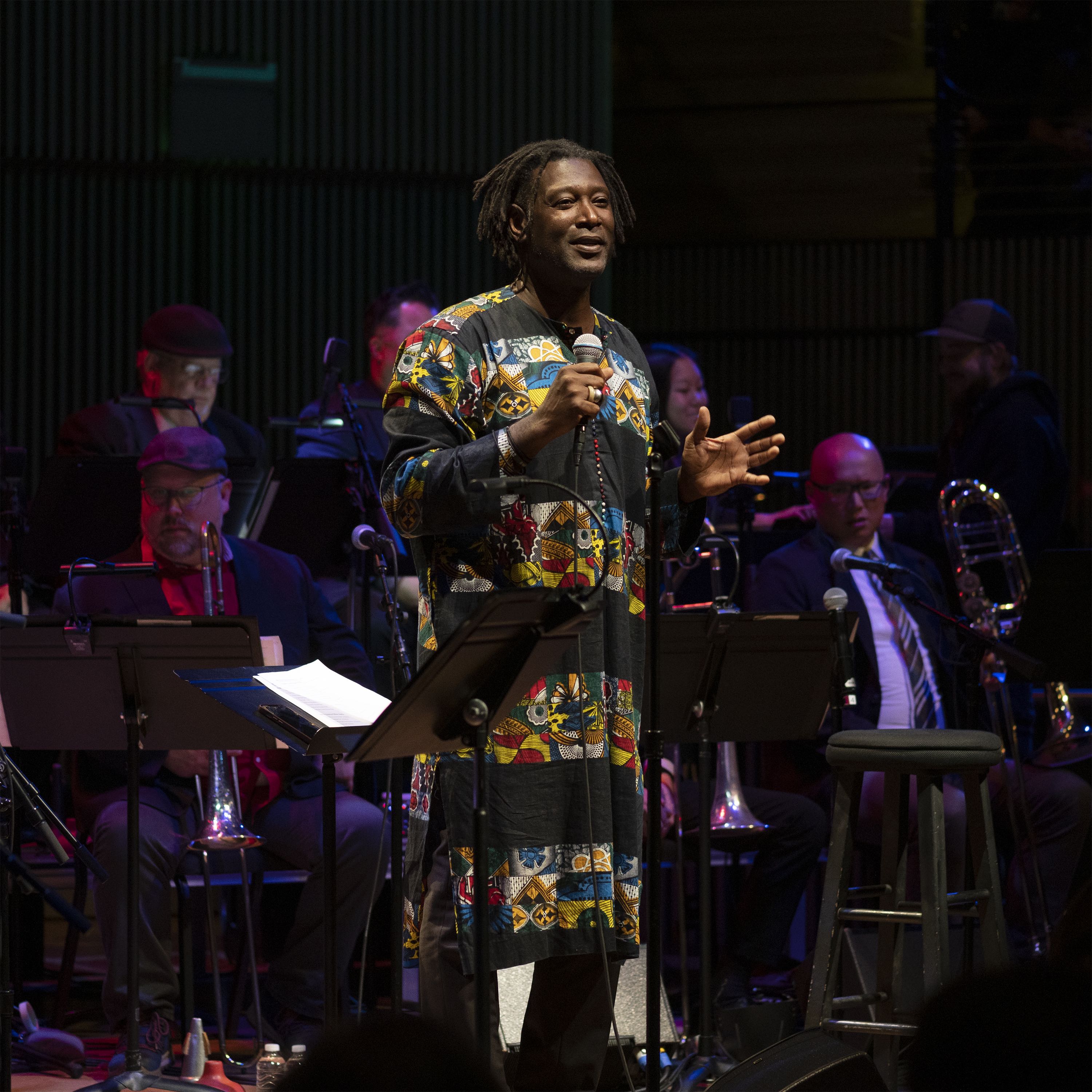In 1944, Tchaikovsky’s famous “The Nutcracker” landed in North America at San Francisco’s War Memorial Opera House. 78 years later — and just down the street — Marcus Shelby and his jazz orchestra hit the bandstand with Duke Ellington’s arrangement, “The Nutcracker Suite,” a true jazz masterwork. But was it really jazz?
“There’s no such thing as jazz,” Shelby said before the Marcus Shelby New Orchestra’s performance on Friday at SFJAZZ as part of their holiday concert series.
On Thursday, Shelby gave a lecture for students in the ITALIC program, who attended Friday’s show. The thesis of the lecture was “Why Jazz?”
Shelby argued that much of what we call jazz is actually the blues. “Not the blues as in the sense of the style of music, but blues as in communication,” he said, referencing the music that goes back to the blues “shouts” and “complaint calls” of slavery. He also referenced ideas of call and response of voices which later became instruments, a technique used heavily in the Ellington arrangement.
Shelby talked about how important it was to capture the sound of Duke Ellington’s band with his ensemble. “It’s not something that you change,” he explained, saying that altering the original arrangements would be akin to changing a Beethoven symphony.

Instead, he focuses on bringing out the work of improvised solos. One of the true standouts was the 16-year-old third trumpet, Skylar Tang. Her solos were dynamic and unpredictable, yet melodic and honest. Another standout soloist was first alto saxophone, Kristen Strong. Her lines were excellent examples of storytelling in jazz; it was obvious she wasn’t just playing for playing’s sake.
The second half of the show featured vocalist Tiffany Austin in a series of holiday songs, ranging from “Have Yourself a Merry Little Christmas” to “Oh Hanukkah” and an original Kwanzaa song written by Shelby and Austin. The night culminated with an audience sing-along of “Jingle Bells.”
In the ITALIC lecture, Shelby taught the class listening techniques to enjoy the concert. He played a clip from Ellington’s 1960 TV promo for “The Nutcracker Suite,” and then played the overture from Tchaikovsky’s version. He asked the class to take a Ratatouille-esque approach to listening, ingesting all the “flavors” of the piece, experiencing each of the instruments separately and then all at once.
He instructed the ITALIC students to point out moments of call and response, as well as moments when leading instruments took over. Singing along as the jazz overture played, Shelby displayed a love for the music that was both moving and electric.

“I’ve heard [The Nutcracker Suite] thousands of times,” said Shelby in his lecture to ITALIC students, “and I hear something new every time.”
Besides authenticity, Shelby has but one other simple goal: “Keep the energy alive. Jazz musicians are always beating their own time … but it’s about bringing people in, bringing in the energy, bringing the dynamics down,” he said.
Shelby also told ITALIC students why the term “orchestra” was important. At a time when large jazz groups headed by Black musicians were referred to as “big bands,” Ellington wanted to bring the gravity of the “Tchaikovsky aesthetic” and “apply it to his own visage,” as Shelby put it.
His grace and professionalism in the classroom was duly matched onstage as well. The performance was strong yet intimate. Those sitting behind the stage were able to see his conducting up close; his quiet remarks to the band made the whole experience feel very personal.
Shelby is a bassist, composer and director of the Healdsburg Jazz Festival. He is best known for his compositions for jazz orchestra, including “Soul of the Movement: Meditations on Dr. Martin Luther King Jr.” He also voiced the character Ray Gardner in the Oscar-winning Pixar movie “Soul.”
Shelby had a strong command of the band, and the group’s synchronicity was astounding. The Marcus Shelby Orchestra lived up to its name — the 15 musicians sounded like a symphony.
Editor’s Note: This article is a review and includes subjective thoughts, opinions and critiques.
